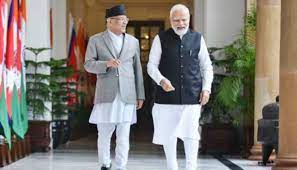After a bilateral conference at Hyderabad House in Delhi on Thursday afternoon, Prime Minister Narendra Modi and his Nepalese counterpart, Pushpa Kamal Dahal, signed seven bilateral agreements. Modi stated that during his first visit to Nepal in 2014, shortly after he became prime minister for the first time, he provided a ‘HIT formula’ to strengthen India-Nepal relations and that today’s agreements would help that relationship become a’super HIT’.

“I recall… in 2014, nine years ago, I made my first trip to Nepal. At the time, I proposed a ‘hit’ formula for India-Nepal relations: highways, interstates, and transstates. I stated that we will establish contacts that will prevent our borders from becoming barriers. Today, the Prime Minister of Nepal and I have made a number of crucial decisions to make our partnership a smashing success,” said Modi.
We will continue to endeavor to elevate India-Nepal relations to the Himalayas.
On his first bilateral voyage abroad since assuming office in December of last year, the Nepalese prime minister announced that he had extended a ‘cordial invitation’ to Modi to visit his country.
“I am making my fourth trip to India. Ancient is the relationship between India and Nepal. Today, we discussed ways to strengthen the connections between the two countries. We also launched many innovative initiatives together,” Dahal said.
The two prime ministers signed a number of important agreements, including new rail links to enhance physical connectivity and a long-term agreement that is expected to strengthen the electricity-generating sectors of each nation.
This is consistent with the expectations for the Nepalese prime minister’s visit.
The power sector
Sources privy to the discussions identified cooperation in the power sector as a “key focus area” and noted that Nepal exports over 450 MW of electricity to India.
Indian firms have expressed interest in constructing hydropower projects in Nepal, and several participated in a summit held in Nepal in April.
India has constructed a number of hydroelectric facilities, such as Pokhara (1 MW), Trisuli (21 MW), Western Gandak (15 MW), and Devighat (14.1 MW), among others.
In addition, Satluj Jal Vidyut Nigam Ltd and the Nepal Electricity Authority have signed agreements for the development and implementation of the 490.2 MW Arun-4 hydropower project.
It is anticipated that the initiative will generate electricity for Nepal, India, and Bangladesh. SJVN owns 51% of the market, while the NEA holds 49%.
Invited to invest in the West Seti Hydropower Project are Indian companies.
Talks on trains and transit
Modi and Dahal virtually inaugurated integrated checkpoints in Rupaidiha, India, and Nepalgunj, Nepal, and a cargo train from Bihar to Nepal. The Nepalese premier was also anticipated to discuss the opening of additional air routes.
The Ramayana Circuit
Ancient and robust religious and cultural connections exist between India and Nepal. “We have decided to expedite projects related to the Ramayana Circuit, one of 15 tourism circuits identified for development, to further strengthen this,” Modi said.
Nepal’s importance
Nepal is vital to India’s overall strategic interests in the region, and the leaders of the two nations have frequently remarked on the age-old ‘roti beti’ relationship, which refers to cross-border marriages between citizens of the two nations.
ALSO READ :India, Singapore to Develop Lifelong Learning, Future-Ready Workforce, and Skills
Over 1,850 kilometers of its frontier is shared with five Indian states: Sikkim, West Bengal, Bihar, Uttar Pradesh, and Uttarakhand. Nepal, which is landlocked, relies significantly on India for the transportation of goods and services, and India provides Nepal with access to the sea.
The India-Nepal Treaty of Peace and Friendship of 1950 is the foundation of the countries’ special relations.




